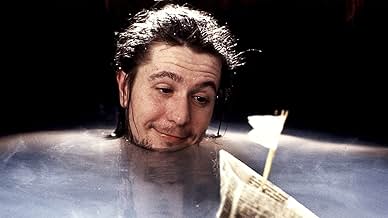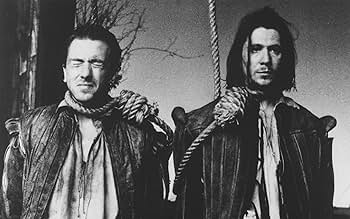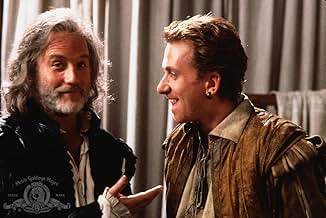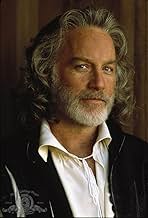Rosencrantz & Guildenstern sont morts
Original title: Rosencrantz & Guildenstern Are Dead
- 1990
- Tous publics
- 1h 57m
Two minor characters from the play 'Hamlet' stumble around unaware of their scripted lives and unable to deviate from them.Two minor characters from the play 'Hamlet' stumble around unaware of their scripted lives and unable to deviate from them.Two minor characters from the play 'Hamlet' stumble around unaware of their scripted lives and unable to deviate from them.
- Awards
- 3 wins & 2 nominations total
Serge Soric
- Tragedian
- (as Srdjan Soric)
Sven Medvesek
- Laertes
- (as Sven Medvesck)
- Director
- Writer
- All cast & crew
- Production, box office & more at IMDbPro
Featured reviews
A wonderfully witty film masterfully transferred from a marvellous stage script to the screen.
The dialogue is constant and highly entertaining, the meshing of Stoppard's modern day speech of the original parts of the story and Shakespeare's original Hamlet practically seamless and masterfully worked.
Gary Oldman gives a superb performance as Guildernstern (or is it Rosencratz - and, at the end of the day, does it matter?) outstanding in a fabulous cast. All in all this film cannot be recommended highly enough.
The dialogue is constant and highly entertaining, the meshing of Stoppard's modern day speech of the original parts of the story and Shakespeare's original Hamlet practically seamless and masterfully worked.
Gary Oldman gives a superb performance as Guildernstern (or is it Rosencratz - and, at the end of the day, does it matter?) outstanding in a fabulous cast. All in all this film cannot be recommended highly enough.
Okay, so you may want to brush up on your knowledge of "Hamlet" before viewing "Rosencrantz and Guildenstern Are Dead", Tom Stoppard's big screen adaptation of his own classic play. Please don't let that frighten you away, or you'll miss out on a seriously funny movie.
The lead roles are extremely well cast. Gary Oldman is hilarious as sweet, befuddled Rosencrantz. Tim Roth's angry, frustrated Guildenstern is the perfect complement. They make a great team.
Stoppard's film has a sprightly step even when raising a few cosmic questions. It's the perfect tonic for some of the more pompous cinematic takes on Shakespeare, and even the Bard would appreciate its sparkling wordplay.
The lead roles are extremely well cast. Gary Oldman is hilarious as sweet, befuddled Rosencrantz. Tim Roth's angry, frustrated Guildenstern is the perfect complement. They make a great team.
Stoppard's film has a sprightly step even when raising a few cosmic questions. It's the perfect tonic for some of the more pompous cinematic takes on Shakespeare, and even the Bard would appreciate its sparkling wordplay.
As an architect, I am often asked what is the world's best building. The answer: a small chapel outside Barcelona started by Gaudi but never finished. We have the model (a bunch of strings) and the basement. But when one visits, it is a profoundly lifechanging place. Gaudi exceeded the building's budget, and then that of the whole community (which was to have been built) before getting out of the ground. But the ambition was so grand, one can see it with only the barest explicit minimum. But, you have to have the reference of what the master intended.
Hamlet is the same. It was never really finished, being so large a conception. Shakespeare tinkered and added over decades. So what Stoppard does here is expand Hamlet by shrinking it. The plot is only glimpsed, but that part was always incidental anyway. The play is about reasoning, and when things are real and when not, and about what element of reality is causal. So instead of giving us the language, Stoppard seizes on one device, the play within the play.
In the raw Hamlet, this is pretty rich, but Stoppard weaves new dimensions of inversion and self-reference. There are at least four levels of play here, and we keep switching about, together with most of the characters. This is not just amusing, but elaborates on `Hamlet,' when is fate real? would it change if we could see the larger clockworks of the universe? does language (specifically query) aid in this endeavor? considering that, are ideas tied to time and fate? This last point is comically illustrated as one of the pair (they don't know who is who) keeps `stumbling' on great ideas, which then vanish.
The play (Stoppard's first) seems to have been his one excellent work, followed by the mundane. Some are unhappy because the film is not so frantic as the 1967 play, but I think that is because there is a different dynamic with a film audience than a stage audience. Fewer tricks can be played. But this is a wonderful solution to the problem of language in film: it is just not cinematic, so best to exploit the dissonance.
There's risk here. The film as film is not great, so set that aside. And the notions are dangerously sophomoric. But that's what makes the whole thing so darned funny. Some critics (notably the normally intelligent Stanley Kauffmann) think Roth and Oldham are poor. But this is a strange sort of acting demand, one for which no measures exist: part surreal, part comic (in different traditions, half Monty Python, half Abbot and Costello) and part tragic confusion. They reward my trust and that's what matters I think. Dreyfus is supposed to be over the top, and he complies.
In the great Hamlet sweepstakes, many recommend seeing Mel Gibson and then Gwyneth Paltrow. I suppose that's a colorful route. But the real sense of what this is all about comes through with more real reward via Branagh and then this clever film.
Hamlet is the same. It was never really finished, being so large a conception. Shakespeare tinkered and added over decades. So what Stoppard does here is expand Hamlet by shrinking it. The plot is only glimpsed, but that part was always incidental anyway. The play is about reasoning, and when things are real and when not, and about what element of reality is causal. So instead of giving us the language, Stoppard seizes on one device, the play within the play.
In the raw Hamlet, this is pretty rich, but Stoppard weaves new dimensions of inversion and self-reference. There are at least four levels of play here, and we keep switching about, together with most of the characters. This is not just amusing, but elaborates on `Hamlet,' when is fate real? would it change if we could see the larger clockworks of the universe? does language (specifically query) aid in this endeavor? considering that, are ideas tied to time and fate? This last point is comically illustrated as one of the pair (they don't know who is who) keeps `stumbling' on great ideas, which then vanish.
The play (Stoppard's first) seems to have been his one excellent work, followed by the mundane. Some are unhappy because the film is not so frantic as the 1967 play, but I think that is because there is a different dynamic with a film audience than a stage audience. Fewer tricks can be played. But this is a wonderful solution to the problem of language in film: it is just not cinematic, so best to exploit the dissonance.
There's risk here. The film as film is not great, so set that aside. And the notions are dangerously sophomoric. But that's what makes the whole thing so darned funny. Some critics (notably the normally intelligent Stanley Kauffmann) think Roth and Oldham are poor. But this is a strange sort of acting demand, one for which no measures exist: part surreal, part comic (in different traditions, half Monty Python, half Abbot and Costello) and part tragic confusion. They reward my trust and that's what matters I think. Dreyfus is supposed to be over the top, and he complies.
In the great Hamlet sweepstakes, many recommend seeing Mel Gibson and then Gwyneth Paltrow. I suppose that's a colorful route. But the real sense of what this is all about comes through with more real reward via Branagh and then this clever film.
Imagine if you will, two talented actors. They are playing quite small roles... the smallest roles in the play so are given no form of direction or motivation for their parts. They are simply told they are "sent for". They are told they are "Rosencrantz and Guildenstern" but no one fully indicated to them which of them were which. No they are thrust bodily into the play itself (Hamlet) and stripped of all their memories of their life before... they have become the characters. They know their cues, instinctively know their lines, but no one bothered to tell them the plot of the play, leaving them to figure it out (or not) for themselves. Their only source of any kind of direction is a player (Dreyfuss) who gives them a rudimentary crash course on dying and tragedy itself ("Generally speaking, things have gone about as far as they can possibly go, when things have gotten about as bad as they can reasonably get.")... and ("We are tragedians. We follow directions. There is no choice involved.") This is Rosencrantz and Guildenstern Are Dead. And it is the funniest intellectually stimulating comedy I've ever seen. Oldman and Roth deliver a wonderful performance, always desperately struggling "get it" but never quite fully understanding what's going on around them. Oldman's portrayal of the existentially distracted Rosencrantz... or is that Guildenstern... was brilliant! (G: Is that you? R: I don't know! G: (disgustedly) It's you.) Viewers who delighted in the "verbal tennis" match might also notice that this really goes on through out the movie. (Player: But why? R: Exactly! G: Exactly what? R: Exactly why. G: Why what? R: What? G: Why? Why what, exactly?) It's truly sad that this movie doesn't get the recognition that it deserves. See Hamlet... become familiar with the story line... and then see this movie. It is quite worth the effort. I give it a 10 out of 10.
This clever screenplay by Tom Stoppard challenges the viewer to listen and watch closely as the Shakespeare tragedy Hamlet is turned on its ear via taking the perspective of the oblivious rhetorics, Rosencrantz and Guildenstern. There are multiple 'plot within plot' twists which intersect and skew at will, sometimes creating a surreal experience for the observer. The script is brilliant, full of double-entendres and mixed reactions executed superbly by Tim Roth and Gary Oldman, along with a solid supporting cast (including American actor Richard Dreyfus). Stoppard felt that the title characters, messengers in the original play, were under represented and so examines their possible perspectives in the tale by way of exploring their destiny and their lack-of-awareness of it. Stunning and hilarious wordplay with excellent repartee between Oldman and Roth. Refreshing and creative spin of the tale of Denmark's 'melancholy prince'.
Did you know
- TriviaOriginally, the two leads (who appropriately spend the movie mixing up their own names) were cast the other way around.
- GoofsThroughout the movie there are scenes where day suddenly changes to night and vice versa. This is a running gag of Tom Stoppard plays which often have "time jumps" written into the stage directions.
- Quotes
Rosencrantz: Do you think Death could possibly be a boat?
Guildenstern: No, no, no... Death is "not." Death isn't. Take my meaning? Death is the ultimate negative. Not-being. You can't not be on a boat.
Rosencrantz: I've frequently not been on boats.
Guildenstern: No, no... What you've been is not on boats.
- ConnectionsEdited into Spisok korabley (2008)
- How long is Rosencrantz & Guildenstern Are Dead?Powered by Alexa
Details
- Release date
- Countries of origin
- Language
- Also known as
- Rosencrantz et Guildenstern sont morts
- Filming locations
- Production companies
- See more company credits at IMDbPro
Box office
- Gross US & Canada
- $739,104
- Opening weekend US & Canada
- $24,004
- Feb 10, 1991
- Gross worldwide
- $739,104
- Runtime
- 1h 57m(117 min)
- Color
- Aspect ratio
- 1.85 : 1
Contribute to this page
Suggest an edit or add missing content































